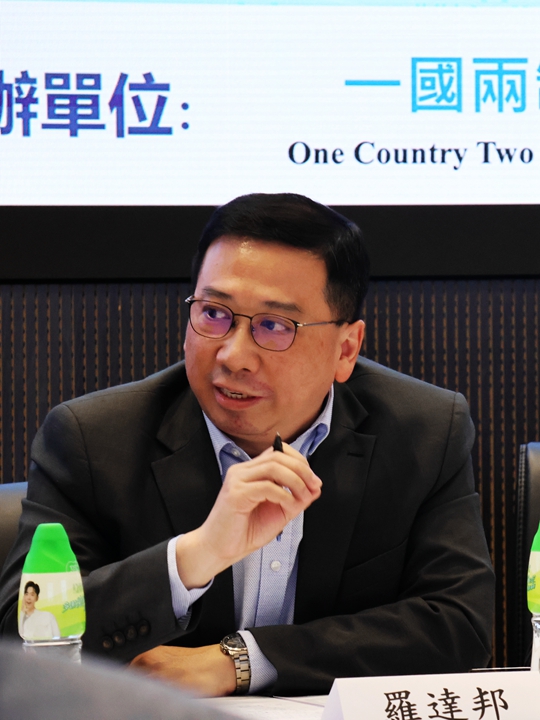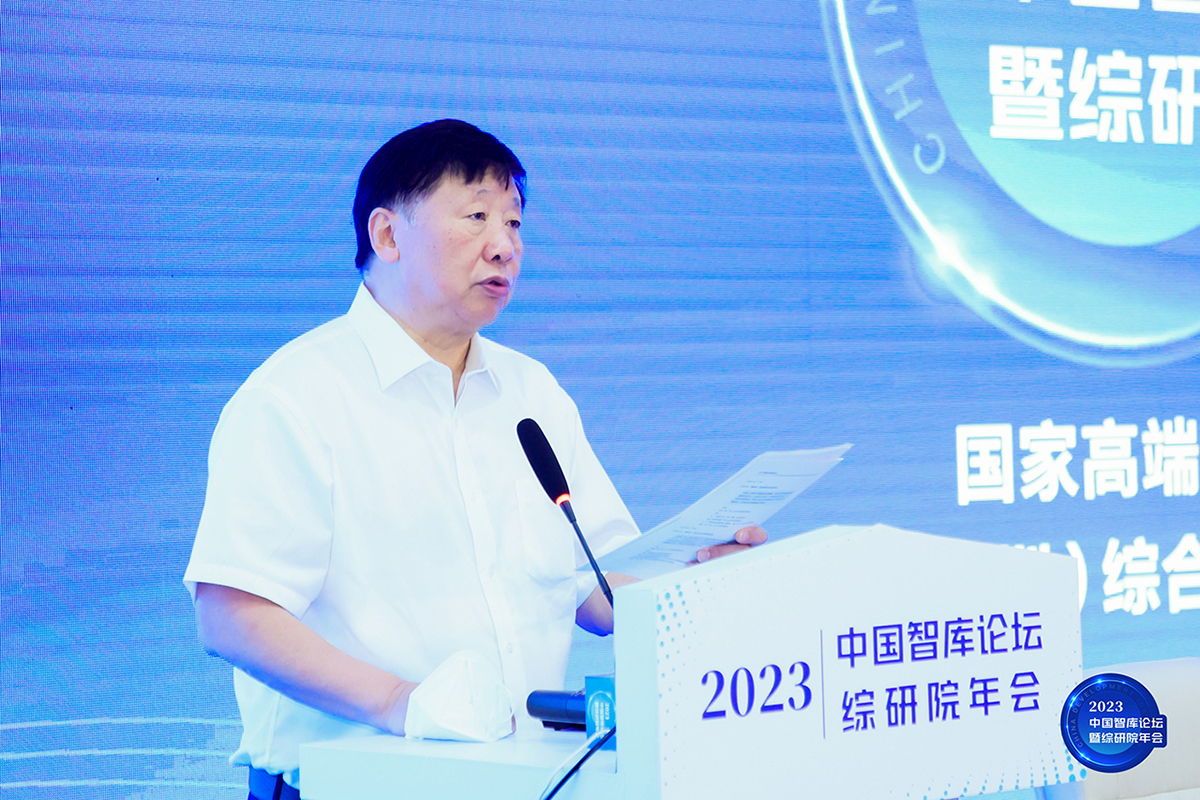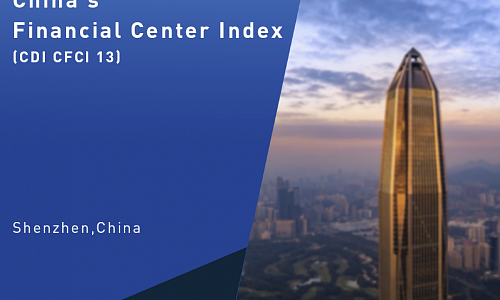
2023 - Events
Information
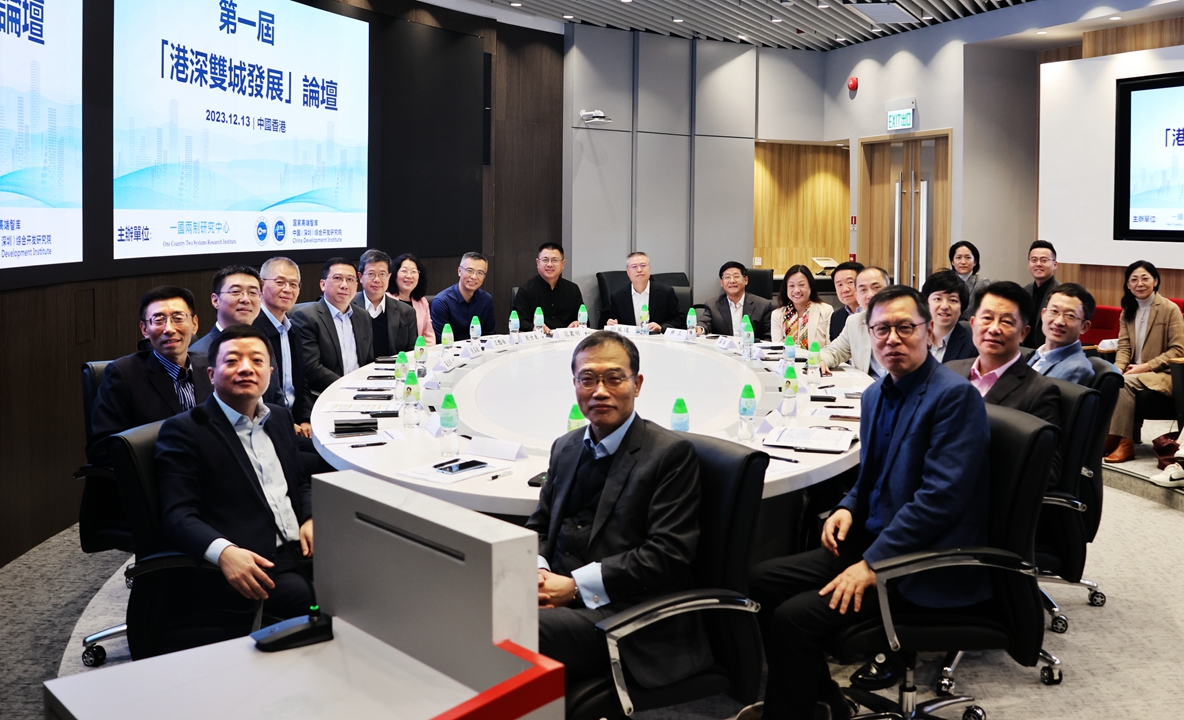
Information
Within the Guangdong-Hong Kong-Macao Greater Bay Area (GBA), collaboration between Hong Kong and Shenzhen is the most iconic and advanced. How should the two major players take advantage of the developmental momentum of the GBA, while collaboratively exploring and identifying new growth poles?
On December 13, 2023, the China Development Institute and the One Country Two Systems Research Institute convened the Shenzhen Hong Kong Cooperation Forum, bringing together experts, professionals and representatives from the government to shed lights on the fresh challenges and prospects in the collaboration between Hong Kong and Shenzhen. Discussion revolved around solutions to effectively address pragmatic issues emerged in the collaboration between the two cities and to foster cooperation in crucial domains. A range of topics were covered, encompassing the Northern Metropolis's development, industrial cooperation, technological innovation, talent acquisition, and regional planning. Emphasis was placed on the pivotal role of technological innovation and industrial development in the regional economy.
Date: December 13, 2023
Hosts: China Development Institute, One Country Two Systems Research Institute
Venue: The Hong Kong Polytechnic University
Information
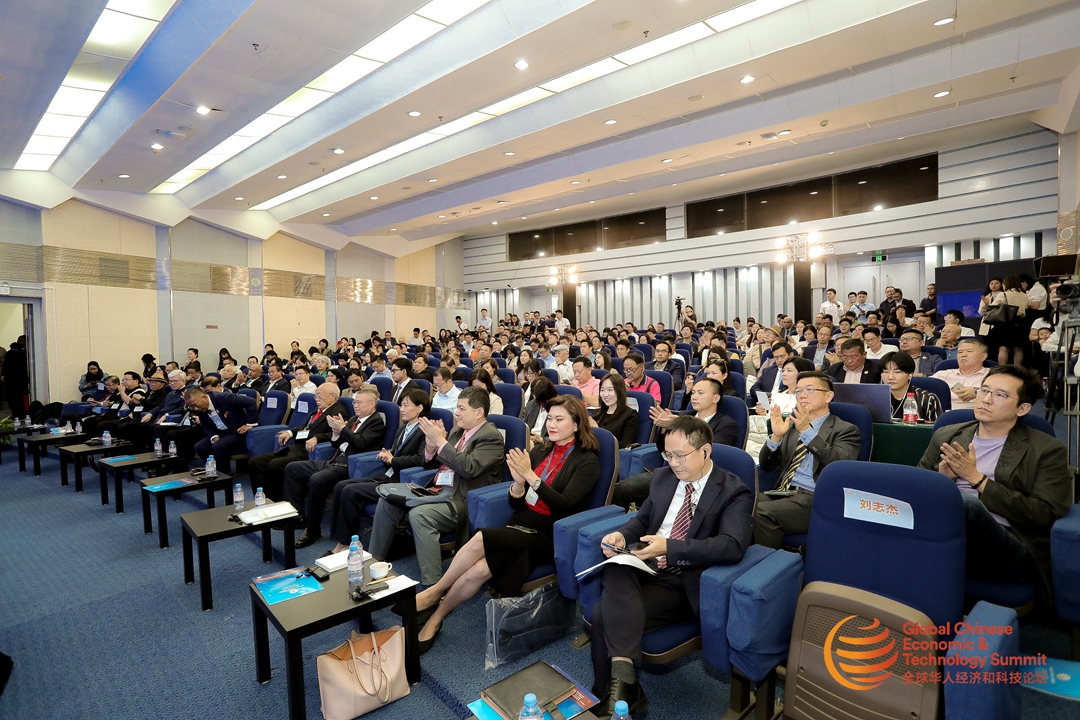
Information
The World Chinese Economic Summit was founded by Tan Sri Lee Kim Yew and Tan Sri Michael Yeoh in 2009. It was first held in the Palace of the Golden Horses, Malaysia and hosted by its Founder and Patron, Tan Sri Lee Kim Yew.
Since then, WCES has been held in Melbourne, Chongqing, London, Melaka, Macao, Beijing, Bonn, and Penang. The Summit emphasized the role of the Global Chinese and connecting the Global Chinese Diaspora as well as promoting learning between East and West.
Resulting from the Global Pandemic and focusing on global recovery, the importance of global partnership, global leadership and global cooperation is imperative. Technology has also become a game changer and a key driver of the global economy – digital technology and innovations, green technology, health technology and agrotechnology will enhance global growth. The growing focus on sustainability also requires technological innovations and solutions.Recognizing these strategic trends of global geopolitical and geoeconomics forces and the power of global partnerships in this new global era, the WCES has been transformed into the Global Chinese Economic and Technology Summit to strive towards sustainable globalization.
China Development Institute has been working closely with the World Chinese Economic Forum committee and co-organize the series of events since 2011. The series has been an essential platform that not only provides practical insights for business and public policy leaders, but also an opportunity for the members of global Chinese community to gather together and exchange ideas.
Date: Nov 6-7, 2023
Hosts: China Development Institute and KSI Strategic Institute for Asia Pacific
Venue: CDI Mansion and Shangri-La, Shenzhen
Information

Information
Date and time: Thursday October 19, 2023 09:00-12:15 (Beijing Time)
Host: China Development Institute and New Zealand China Council
New Zealand and China are both committed to pursuing ambitious national carbon emission reduction goals. Transport emissions including from international air and sea transport are a commonly discussed aspect of global emission reduction strategies. But the adaptations that air and sea ports will need to make to service greener transportation, as well decarbonisation of port operations in other ways, have been less of a focus. Ports in New Zealand and China are, however, making innovative progress in this area.
In this half-day dialogue organised by China Development Institute and New Zealand China Council, senior executives and experts from the air and sea industries in China and New Zealand are gathered to discuss decarbonisation progress and challenges for air and sea ports in New Zealand and China, and to identify future collaboration opportunities between the two countries.
Information
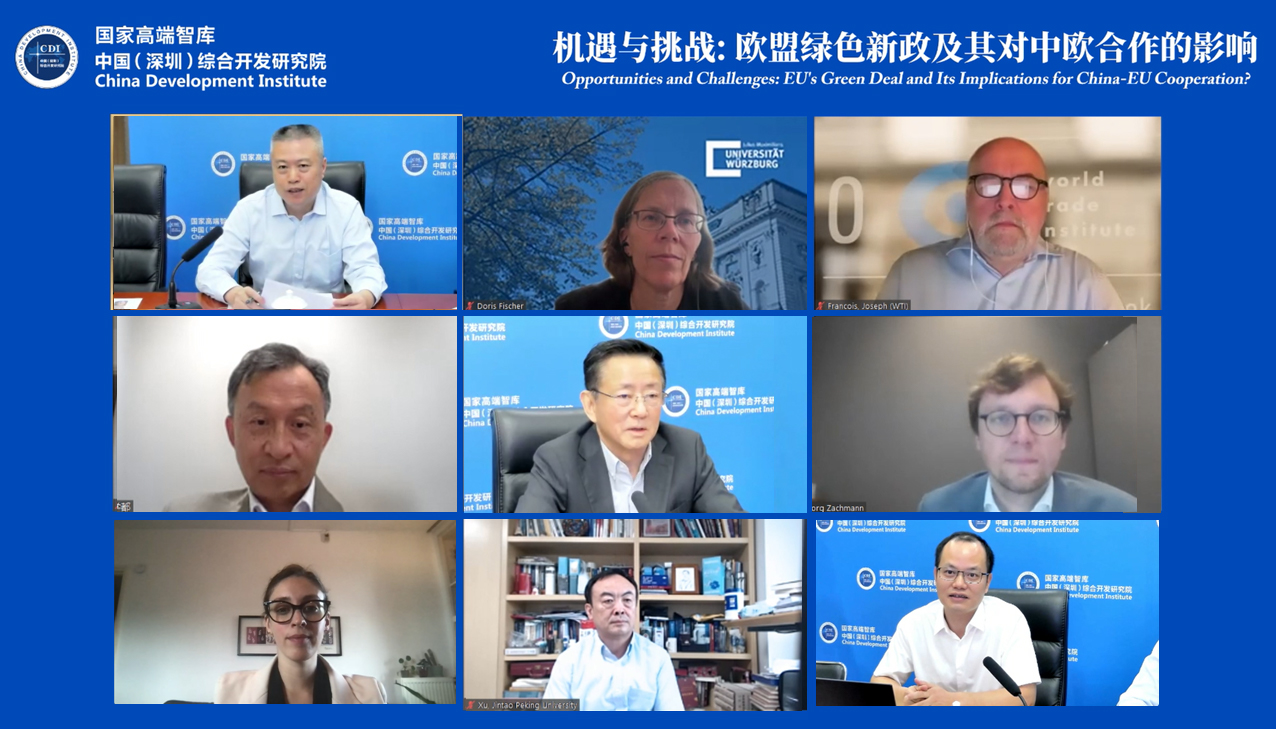
Information
Date and time: Wednesday July 12, 2023 15:00-17:10 (Beijing Time)
Host: China Development Institute
The EU’s rules for the new carbon border adjustment mechanism (CBAM) became effective on 17 May. CBAM aims to prevent carbon leakage and restore a level playing field in high-emitting industries. Designed as a border tax, CBAM will inevitably have significant impacts on EU’s trade partners, but also important influence on promoting the adjustment of global climate policy. Looking ahead, initiatives that could lead to mutually beneficial outcomes would positively affect EU-China cooperation, which will be necessary for global climate actions to succeed.
In view of the abovementioned situation, China Development Institute will hold a webinar convening experts from China and EU to discuss the CBAM’s design along with the likely implications for global trade, global climate policy and China-EU cooperation, and provide policy recommendations for both sides.
Focus for Debate
- What impact will the implementation of EU's CBAM bring to China-EU economic cooperation, and how should they be addressed properly?
- How can Chinese enterprises investing in Europe cooperate with the EU side to better adapt to the European Green Deal, considering that the EU has rich experience in the field of green development?
- How to facilitate the development of China's carbon trading market and promote the synergy of rules and mechanisms between China and EU in green development?
- How to coordinate the development of free trade and green trade under the new mechanism of EU's CBAM?
*Available in English and Chinese.
Register in advance for this webinar:
https://us06web.zoom.us/webinar/register/WN_ZaL3kD5MQta3H8SeS-6zcQ
After registering, you will receive a confirmation email containing information about joining the webinar.
Information
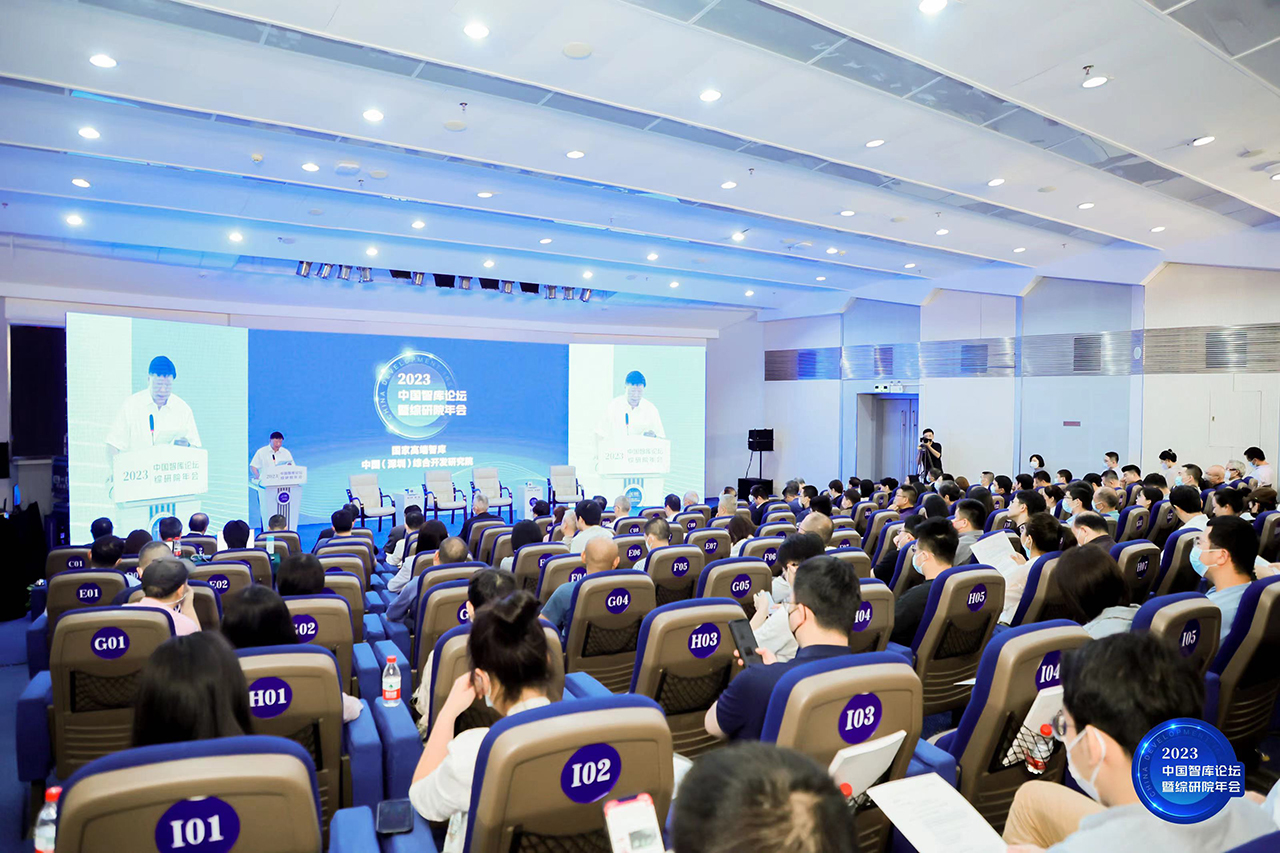
Information
The year 2023 marks the 45th anniversary of China’s reform and opening-up. Currently, China is in the midst of increasingly complicated international political and economic environment and needs to tackle domestic issues such as the lack of scientific and technological innovation power, the insufficient supply system, the considerable regional differences, while trying to build the unified national market.
Themed “High-level of Opening-up and High-quality Development in the New Era”, the 2023 China Think Tank Forum (CDI Annual Conference) organized by China Development Institute brought together experts to debate on how China should address the domestic and international challenges in order to provide policy recommendation to decision makers.
Date: May 27, 2023
Venue: CDI Mansion
Host: CDI
Theme: High-level of Opening-up and High-quality Development in the New Era
Information

Information
The Dalian International Finance and Development Forum gathered renowned international and domestic experts, scholars, entrepreneurs and people from all walks of life to debate on the development of financial opening and cooperation in Northeast Asia, Northeast Asian commodity futures market development and supply chain security, financial services for the high-quality development of the real economy, and the construction of Dalian as a regional financial center. The financial forum is aimed to provide practical policy recommendation for decision-makers.
Organizers: Dalian Financial Development Bureau, China Development Institute
Date: April 21, 2023
Venue: Dalian International Conference Center
Information
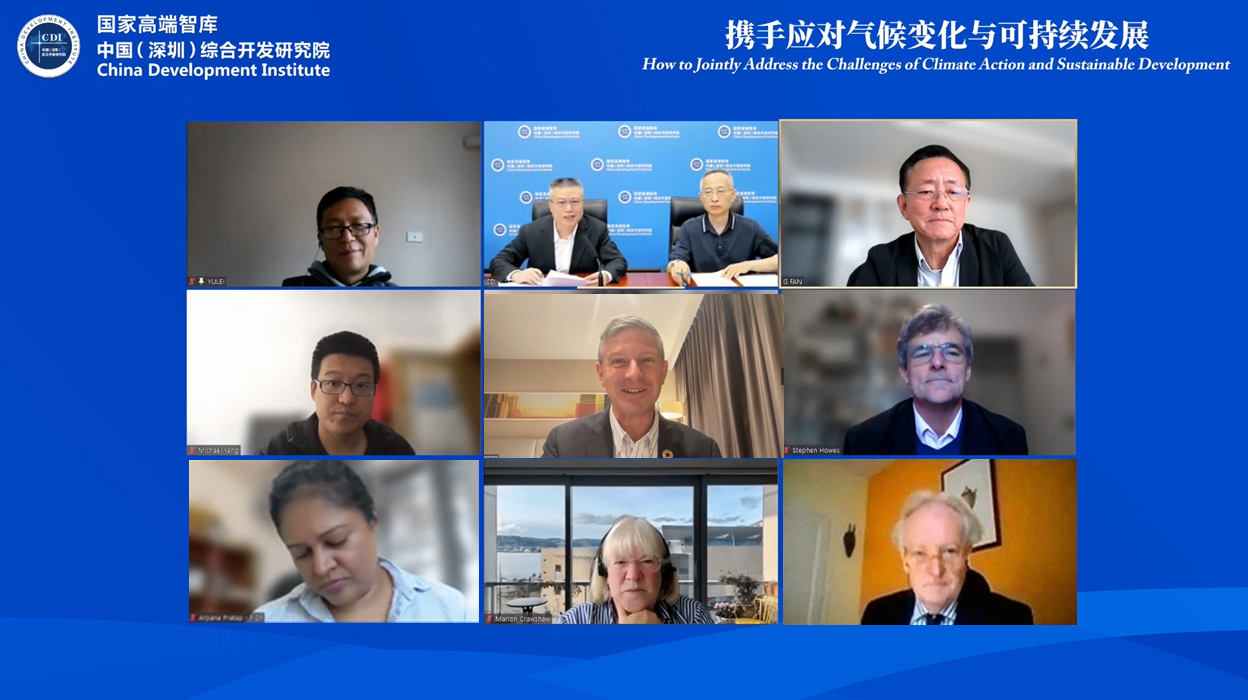
Information
As the international geopolitical and geoeconomic uncertainty continues, world economic development is struggling to regain sustained growth. Pacific islands region is abundant in natural resources, but also one of the most economically and environmentally vulnerable regions in the world and is also faced with increasingly complex challenges.
Regional effort in addressing the challenges of climate action and sustainable development is necessary for the prosperity of the Pacific Islands as seen in the 2050 Strategy for the Blue Pacific Continent endorsed by the Pacific Islands Forum Leaders in 2022. Meanwhile, China, a Pacific Islands Forum’s dialogue partner and stronger supporter for the 2050 Strategy, also emphasized green development in the Belt and Road Initiative.
In order to enhance connectivity, achieve climate goals and attain sustainable development, Pacific Islands and the other concerning parties should synergize their development initiatives and deepen cooperation while advocating the principles of mutual respect, joint development and benefits sharing.
With a vision of fueling the momentum for the Pacific Islands maritime economic cooperation, the webinar organized by China Development Institute will gather experts to discuss ways to propel the cooperation across pacific islands on connectivity, climate action and sustainable development.
Debates
- How do the 2050 Strategy for the Blue Pacific Continent and the Initiative for Belt& Road Partnership on Green Development complement and reinforce each other, especially by addressing climate change and sustainable developmment?
- What could be done in the cooperattion of green investment to further enhance financing support for Pacific Islands in climate change adaptation?
- How to better promote more tripartite or multilateral cooperation of sustainable development projects across Pacific Islands countries?
- Among wide range of priority cooperations such as marine environment, renewable energy and e-commerce, etc, which specific areas Pacific Islands and China can mainly focus on for the early harvests?
Date: April 12, 2023
Organizer: China Development Institute
Information
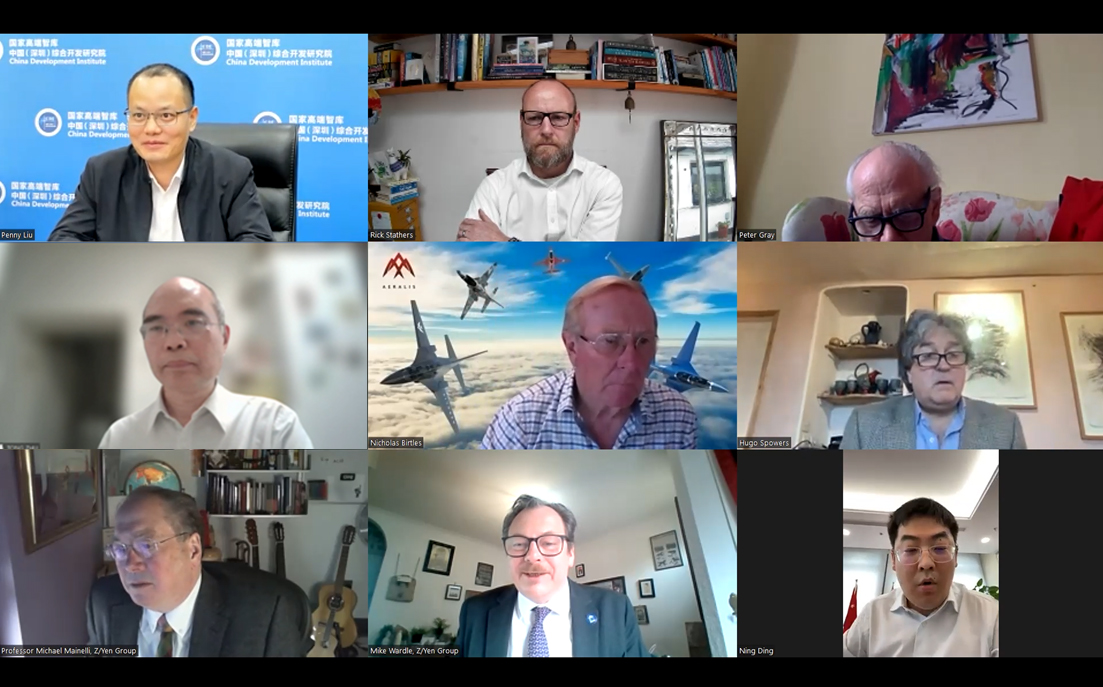
Information
Most hydrogen currently produced is made using natural gas. As we go forward, hydrogen will increasingly be produced using renewable energy sources and the price of this production is likely to come down over time. Hydrogen and ammonia, produced using hydrogen, are potential game changers in replacing fossil fuels.
In this webinar we will hear from experts from China and Europe on their predictions for green hydrogen in the transition from fossil fuels.
Date: April 27, 2023
Organizers: China Development Institute and Z/Yen Group
Information
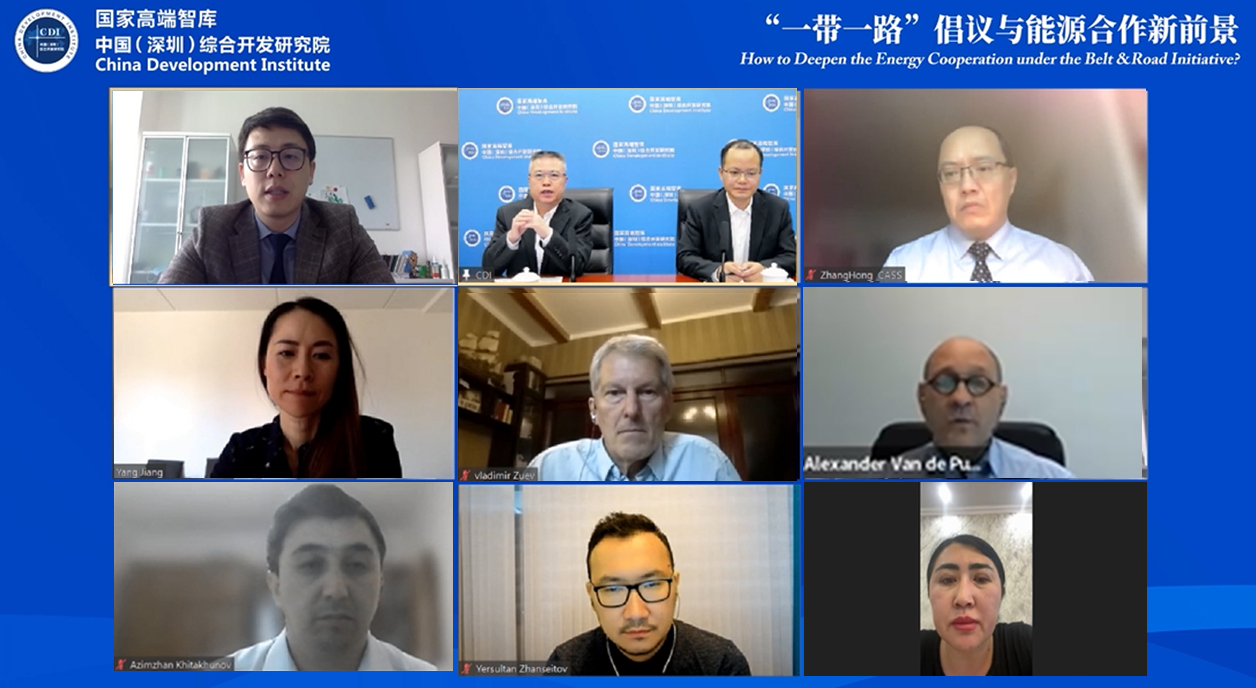
Information
Since the establishment of diplomatic relations between China and the five Central Asian countries — Kazakhstan, Kyrgyzstan, Tajikistan, Turkmenistan and Uzbekistan in 1992, the two sides have continued to deepen industrial cooperation in key areas. In 2022, the bilateral trade volume between China and the five Central Asian countries surged by around 40 percent to $70.2 billion, and the outbound direct investment from China to the five countries reached $970 million. China has become important economic and trade partner of the five Central Asian countries.
In recent years, the whole energy supply chain has faced greater uncertainties due to the geopolitical tensions and the imbalance between oil supply and demand. As a key area for China and the five Central Asian countries to jointly build Belt and Road Initiative, the energy cooperation between the two sides has effectively enhanced the resilience of the regional industrial and supply chain, and maintained the stable development of regional economy.
Looking ahead to the future, China and the five Central Asian countries should jointly ensure the stable supply of oil and gas, further deepen the cooperation of the regional industrial and supply chain, and promote the development of renewable energy such as wind power and photovoltaic power, so as to make the prospect of energy and economic cooperation between China and Central Asian countries more safe, stable and sustainable.
Debates
- How do you view the prospects of energy cooperation between China and the five Central Asian countries under the BRI against the current changes of global energy industry, and also your expectation for China's role?
- What could China and the five Central Asian countries do to strengthen the interconnection of energy infrastructure and ensure the security and stability of the energy resources industry chain?
- How to jointly promote green and low-carbon energy transformation and steadily expand new energy cooperation areas on the basis of consolidating traditional energy cooperation?
- What impact will Russia’s role bring to the regional energy stability and cooperation under the Belt and Road Initiative?
Date and Time: May 9, 2023 15:00-17:00 (GMT+8)
Host: China Development Institute
Information
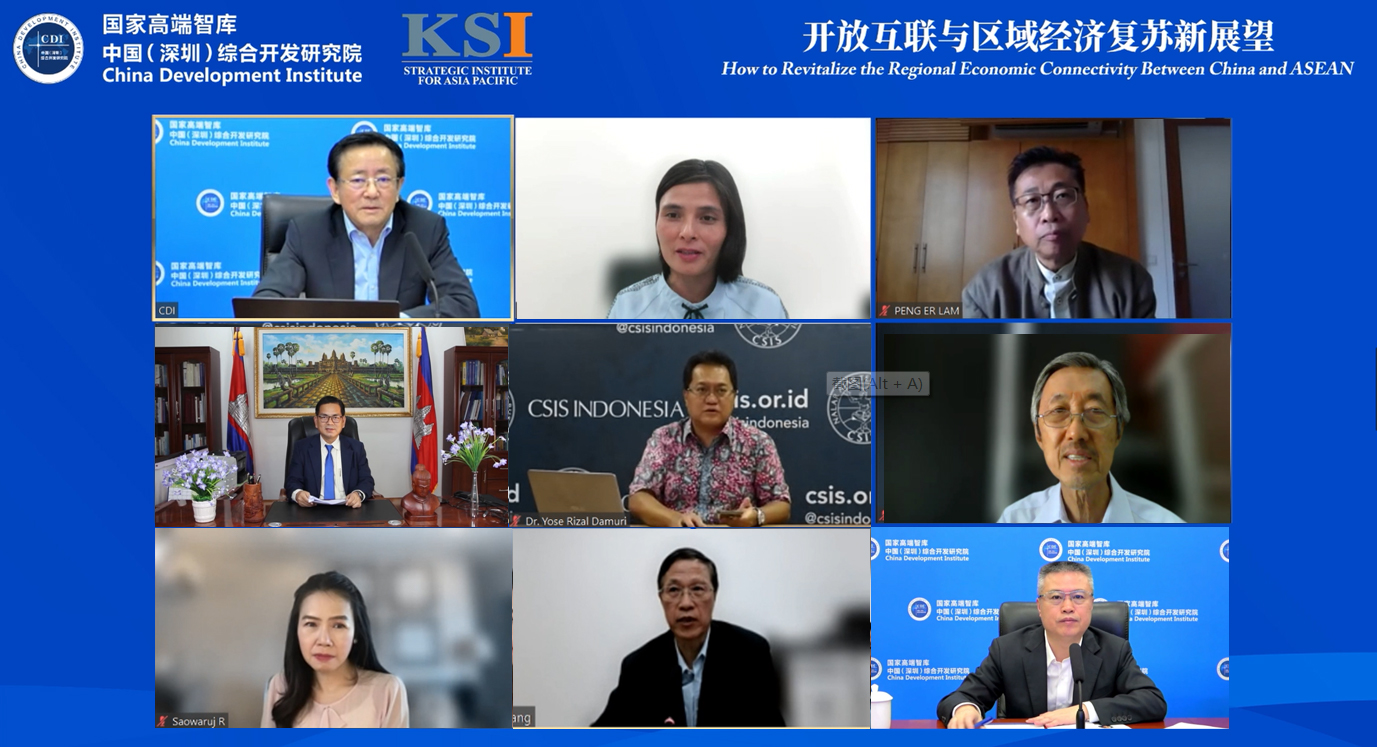
Information
In November 2022, at the 25th ASEAN-China Summit held in Phnom Penh, the two sides announced ASEAN-China Joint Statement on Strengthening Common and Sustainable Development, emphasizing the effective synergy between statements and visions put forward by ASEAN and China will be conducive to realizing the Sustainable Development Goals(SDGs) in the region and beyond. A new chapter of bilateral partnership is expected to unleashed, heading toward high-standard cooperation.
Since the establishment of ASEAN-China Dialogue Relations in 1991, cooperative relations between both sides have been tested and deepened. Driven by free trade mechanisms such as the upgraded China-ASEAN FTA and the RCEP, the trade volume between both sides has grown rapidly. In 2022, China remained ASEAN's largest trading partner for the 13th consecutive year, while ASEAN became China's largest trading partner. Even so, trade frictions and geopolitical crises in recent years had increased future economic uncertainties. With the international economic situation keeps changing, China and ASEAN cannot be isolated from the outside world. How can China and ASEAN make joint effort to boost the economic recovery in the face of major challenges is worth addressing.
Against such background, the webinar hosted by China Development Institute (CDI) and KSI Strategic Institute for Asia Pacific (KSI) will provide a platform for exchanges on the cooperation and challenges we are facing. This event has lasted for several years and we are grateful to those participating think tanks for their contribution of knowledge and wisdom.
Debates
- Facing growing geopolitical competitions and protectionism in the post-pandemic era, how can China better integrate to the regional economic cooperation with ASEAN?
- What challenges and risks still remain when it comes to synergizing the Belt and Road Initiative and Master Plan on ASEAN Connectivity 2025 in jointly enhancing connectivity and stability of regional supply chain, and how should they be addressed properly?
- What could be done in the region to promote cooperation with the opportunity of the Fourth Industrial Revolution and digital transformation to achieve green industrialization and sustainable growth?
More...
Information
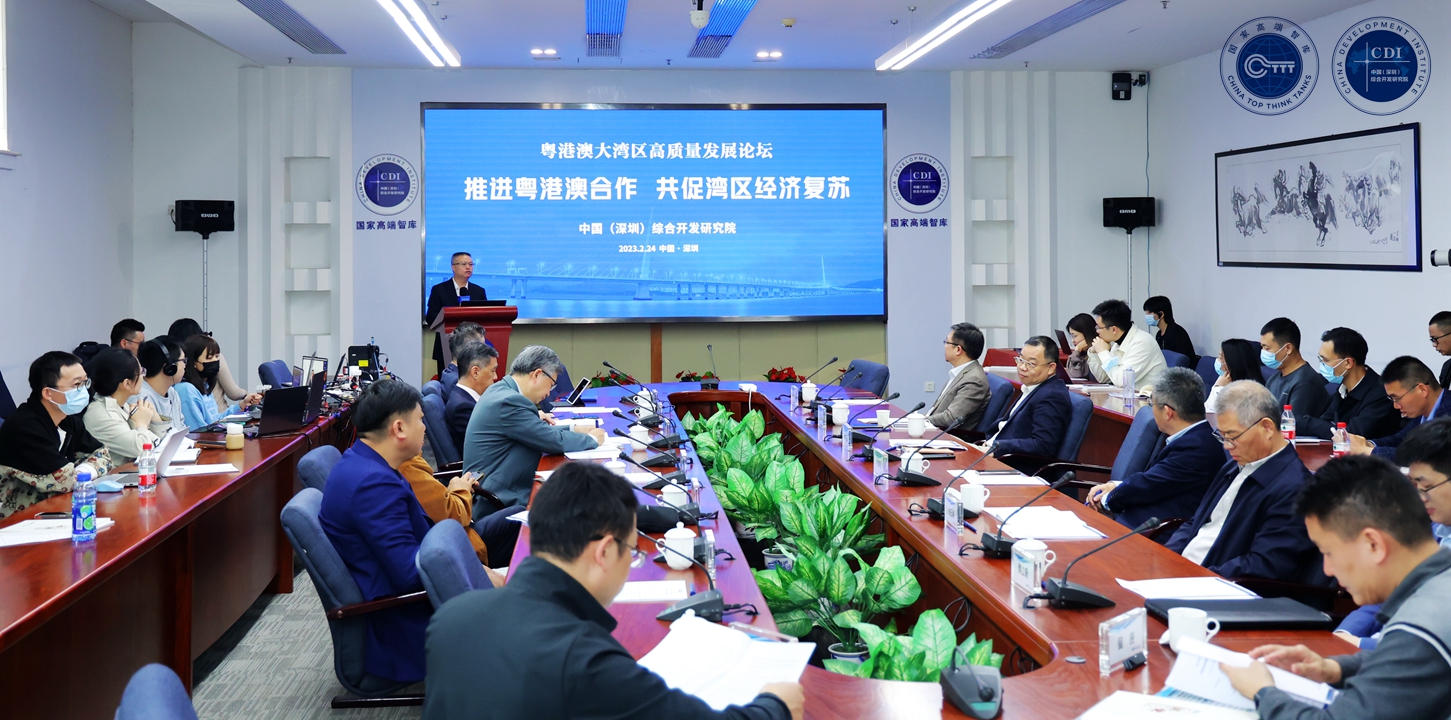
Information
On February 6, 2023, Chinese mainland and Hong Kong border fully reopened. The full resumption of flow of people at the Shenzhen-Hong Kong ports will greatly facilitate the interconnection between Hong Kong, Macao and mainland cities, stimulating the demand for tourism, shopping, business, and investment, etc., accelerating the integration of technology, capital and other resources, and contributing to the economic development of the Guangdong-Hong Kong-Macao Greater Bay Area (GBA).
In the face of new challenges in the global economy, the GBA development should be oriented towards more open cooperation. Therefore, in the future, how to further strengthen the GBA cooperation mechanism, promote economic and trade exchanges, and strengthen high-level cooperation between GBA cities is crucial.
In this forum, organized by the China Development Institute, experts from the GBA were gathered together to discuss how Guangdong, Hong Kong and Macao should deepen regional connectivity, and expand dialogues in terms of coordinated industrial development and integrated social development.
Date and time: Friday Feb 24, 2023
Host: China Development Institute

